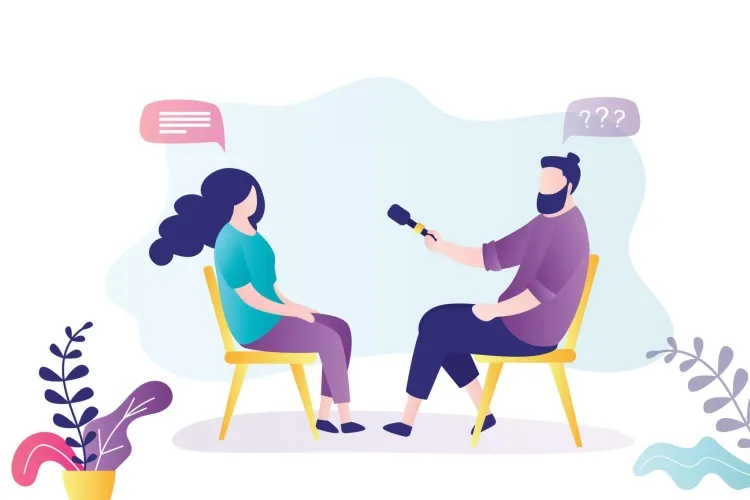Navigating the Job Interview Maze: Strategies for Handling Tough Questions and Bouncing Back Strong
Learn effective strategies for handling tough interview questions with confidence and finesse. Explore tips for active listening, strategic responses, and recovering from fumbles to ace your next job interview.

Table of Content
Lets imagine a Job Interview scene
The room is dimly lit, casting long shadows across the stark white walls. At the center sits a sturdy wooden table, worn from years of use. On one side, a panel of stern-faced interviewers, their expressions inscrutable behind a veil of professionalism. On the other, a lone figure, seated with squared shoulders, but eyes betraying nervous tension.
The interviewee's palms are clammy as they grip the edges of their seat, awaiting the onslaught of questions. Each query feels like a verbal gauntlet, probing weaknesses and testing resilience. The atmosphere crackles with the weight of expectation, every word weighed and measured.

Outside, the world buzzes on, unaware of the intensity within this enclosed space. Time seems to stretch, minutes feeling like hours as the interrogation presses on. Sweat beads on the interviewee's brow, but they steel themselves, determined to weather the storm.
But amidst the tension, there's a glimmer of hope. A question met with a confident response, a shared moment of understanding. Slowly, the atmosphere begins to shift, the interview transitioning from a battle of wills to a dialogue of potential.
And as the final question is posed, there's a sense of closure, of relief mingled with anticipation. The tough job interview has been weathered, its challenges faced head-on. Whatever the outcome, the experience will be etched into memory, a testament to resilience in the face of adversity.
That's a typical interview with tough questions. Right?
In the high-stakes world of job interviews, facing challenging questions can be nerve-wracking. However, it's not uncommon to encounter queries that leave you stumped. How you handle these moments can make a significant difference in the outcome of your interview. This article aims to equip you with practical strategies to navigate difficult questions with confidence and finesse.
Understanding the Importance of Preparation: Preparation is key to success in any job interview. Researching the company, understanding the role you're applying for, and anticipating common interview questions are fundamental steps. However, even with thorough preparation, you may encounter unexpected or difficult questions that catch you off guard.
Check out this comprehensive guide for Expert Tips for getting your dream job.
Acceptance and Composure
The first step in handling a tough interview question is to remain calm and composed. Accept that it's okay not to have all the answers.
Take a moment to collect your thoughts before responding. Maintaining a confident demeanor can help mitigate the impact of being unable to answer a question immediately.
Active Listening and Clarification: If you're unsure about a question, don't hesitate to seek clarification. Active listening is crucial in understanding what the interviewer is asking. Repeat the question or ask for further explanation to ensure you grasp the context correctly. This demonstrates your attentiveness and commitment to providing a thoughtful response.

Strategies for Responding
When faced with a challenging question, employ strategic techniques to formulate your response:
A. Bridge to Relevant Experience:
If you don't have a direct answer, relate the question to relevant experiences or skills you possess. Highlighting transferable skills or past achievements can demonstrate your suitability for the role. Your answer could be:
"In my previous roles, I've encountered situations where I needed to adapt quickly to new challenges or technologies. For instance, there was a project where we had to implement a new system that none of us had prior experience with. Despite the initial learning curve, I took the initiative to dive deep into the technology, leveraging my problem-solving skills and ability to learn quickly. Eventually, I became proficient in the system and played a key role in its successful implementation.
Additionally, I've always been proactive in seeking out opportunities for skill development and growth. Whether it's attending workshops, online courses, or taking on challenging projects, I've consistently demonstrated my eagerness to learn and expand my expertise.
Furthermore, my strong communication skills and ability to collaborate effectively with cross-functional teams have been instrumental in driving project success. In one particular project, I was tasked with leading a diverse team of individuals with varying skill sets and backgrounds. Through clear communication, active listening, and fostering a collaborative environment, we were able to overcome obstacles and deliver exceptional results within tight deadlines.
Overall, while I may not have direct experience with every aspect of the role, my transferable skills, adaptability, and commitment to continuous learning make me confident in my ability to excel and contribute positively to your team."
B. Acknowledge Limitations and Pivot positively
Be honest about your inability to answer the question directly. However, emphasize your willingness to learn and adapt.
for example if Interviewer asks
"Can you explain how you would approach [specific scenario or task]?"
Use the opportunity to showcase your problem-solving abilities and critical thinking skills. Redirect the conversation towards a topic where you can confidently contribute. For example, Your Response:
"While I haven't encountered this scenario before, I'm eager to explore it further and learn from the experience. My approach in situations where I'm faced with unfamiliar challenges involves several key steps.
Firstly, I would take the time to thoroughly understand the requirements and objectives of the task at hand. This would involve conducting research, seeking clarification from relevant sources, and gathering as much information as possible to inform my approach.
Secondly, I would leverage my existing skills and expertise that are applicable to the situation. While I may not have direct experience with this specific scenario, I can draw from my past experiences and transferable skills to develop a strategy or framework for tackling the challenge.
Additionally, I would proactively seek guidance and advice from colleagues, mentors, or subject matter experts who may have more experience in this area. Collaboration and knowledge-sharing are invaluable resources that can help bridge gaps in my understanding and provide valuable insights.
Furthermore, I'm committed to continuous learning and professional development. If there are specific tools, techniques, or concepts related to this scenario that I need to familiarize myself with, I'm more than willing to invest the time and effort to upskill and expand my knowledge base.
In summary, while I may not have all the answers right now, I'm confident in my ability to approach unfamiliar challenges with a positive attitude, a willingness to learn, and a proactive mindset. I see each new experience as an opportunity for growth and improvement, and I'm excited about the prospect of expanding my capabilities in this area."
This response acknowledges the limitation of knowledge while highlighting your eagerness to learn, adaptability, and proactive approach to problem-solving. It demonstrates to the interviewer that you are open-minded and enthusiastic about taking on new challenges.
C. Reframe the Question:
Sometimes, a challenging question may seem unclear or ambiguous. In such cases, rephrasing the question in your own words can help you better understand what the interviewer is asking. This not only shows your active engagement but also allows you to steer the conversation towards areas where you feel more confident.
Reframing a tough interview question involves shifting the focus of the question to highlight your strengths, experiences, and positive attributes, while addressing any potential limitations or challenges in a constructive manner. Here's a general approach to reframing a tough interview question:
-
Identify the Core Concern:
Understand the underlying intention or concern behind the question. What is the interviewer trying to assess or evaluate? Is it your problem-solving skills, ability to work under pressure, or aptitude for a specific task? -
Highlight Relevant Experience:
Draw upon relevant experiences, skills, and achievements that demonstrate your capability to handle similar situations or tasks. Emphasize how your past experiences have prepared you for the challenge at hand. -
Address Limitations Positively:
Acknowledge any limitations or gaps in your knowledge or experience, but frame them in a positive light. Express your willingness to learn, adapt, and seek guidance or training as needed. -
Offer a Solution or Plan:
Provide a clear and proactive plan for addressing the challenge or overcoming the limitation. Demonstrate your problem-solving abilities by outlining concrete steps you would take to tackle the situation effectively. -
Reiterate Confidence and Enthusiasm:
Conclude your response with a reaffirmation of your confidence in your abilities and your enthusiasm for the opportunity. Express your commitment to contributing positively to the role and the organization.
Here's an example of reframing a tough interview question:
Question: "How do you handle high-pressure situations where deadlines are tight and resources are limited?"
Reframed Response:
"While managing high-pressure situations with tight deadlines and limited resources can certainly be challenging, I've found that my past experiences have equipped me with the necessary skills and mindset to thrive in such environments. In my previous role, I encountered several instances where we faced similar circumstances, such as [provide specific example].
During these times, I prioritized tasks effectively, collaborated closely with team members to allocate resources efficiently, and maintained clear communication channels to ensure everyone was aligned on goals and expectations. Additionally, I remained calm under pressure and approached each challenge with a solution-oriented mindset.
That being said, I understand that every situation is unique, and there may be instances where I encounter unfamiliar challenges. In such cases, I am proactive about seeking guidance from experienced colleagues, leveraging available resources, and continuously learning and adapting to new circumstances.
If faced with a high-pressure situation in this role, I would approach it by first assessing the scope and urgency of the task, then devising a strategic plan that maximizes available resources and minimizes risk. I would also maintain open lines of communication with stakeholders to manage expectations and ensure alignment on priorities.
Overall, while I recognize the inherent difficulty of handling high-pressure situations, I am confident in my ability to rise to the occasion and deliver results. I am eager for the opportunity to contribute positively to your team and demonstrate my ability to excel in challenging environments."
D. Use the "Pause and Reflect" Technique:
Instead of rushing to answer a difficult question, take a moment to pause and reflect. This brief pause not only gives you time to gather your thoughts but also projects an image of thoughtfulness and deliberation. It's better to deliver a well-thought-out response than to hastily provide an incomplete or incorrect answer.
The "Pause and Reflect" technique is a valuable strategy for handling tough interview questions or challenging situations. It involves taking a moment to pause, gather your thoughts, and reflect on the question or situation before responding. Here's how to use the "Pause and Reflect" technique effectively:
Pause:
When you encounter a tough interview question or situation that catches you off guard, resist the urge to immediately respond. Instead, take a brief pause to collect yourself and compose your thoughts. This pause allows you to avoid rushing into a response and gives you time to process the question or situation more effectively.
Breathe:
Use this pause to take a few deep breaths to help calm your nerves and focus your mind. Deep breathing can help reduce stress and anxiety, allowing you to approach the question with a clearer mindset.
Reflect:
During the pause, take a moment to reflect on the question or situation. Consider what the interviewer is asking, why they might be asking it, and how it relates to your skills, experiences, and the role you're interviewing for. Reflect on your past experiences, relevant skills, and any examples or anecdotes that you can draw upon to support your response.
Clarify:
If you're unsure about the question or need clarification, don't hesitate to ask. Politely ask the interviewer to repeat or rephrase the question, or seek clarification on specific aspects that are unclear to you. This demonstrates your attention to detail and your commitment to providing a thoughtful and accurate response.
Respond:
After pausing and reflecting, respond to the question confidently and thoughtfully. Structure your response clearly, addressing each aspect of the question systematically. Draw upon your relevant experiences, skills, and achievements to support your answer, and articulate your thoughts in a clear and concise manner.
Embrace Silence:
Don't be afraid of silence during your pause or after you've responded. Allow yourself and the interviewer a moment to absorb the information and consider the next steps. Silence can be powerful and can indicate that you're taking the question seriously and providing a considered response.
Adapt:
As you continue with the interview or conversation, remain adaptable and open-minded. If new information or insights arise, be willing to adjust your responses accordingly. Use each pause as an opportunity to reassess and refine your approach as needed.
By using the "Pause and Reflect" technique, you can approach tough interview questions or challenging situations with composure, clarity, and confidence, ultimately enhancing your ability to navigate them effectively.
E. Showcase Your Soft Skills:
Even if you lack specific technical knowledge or experience, emphasize your soft skills such as adaptability, communication, teamwork, and problem-solving abilities. Employers often value these skills just as much as technical expertise, especially in roles that require collaboration or client interaction.
Showcasing soft skills during an interview is crucial for demonstrating your suitability for the role and your ability to work well with others. Here are some effective strategies for showcasing soft skills:
-
Prepare Stories:
Before the interview, identify specific examples from your past experiences that highlight your soft skills. These could include instances where you demonstrated leadership, communication, teamwork, problem-solving, adaptability, or other relevant skills. Prepare concise stories or anecdotes that illustrate each skill in action. -
Use the STAR Method:
When discussing your experiences, use the STAR method (Situation, Task, Action, Result) to structure your responses. Start by describing the situation or context, then explain the task you were faced with, the actions you took to address it, and the results or outcomes of your actions. This structured approach helps interviewers understand how you apply your soft skills in real-world situations. -
Provide Specific Examples:
When discussing your soft skills, provide specific examples that demonstrate how you've successfully applied them in various situations. Avoid vague or generic statements and instead focus on tangible outcomes and achievements. For example, instead of saying "I'm a good communicator," you could say "In my previous role, I led weekly team meetings where I effectively communicated project updates, deadlines, and expectations, resulting in improved team cohesion and productivity." -
Tailor Responses to the Job:
Tailor your responses to align with the specific requirements of the job and the company culture. Consider which soft skills are most relevant to the role and emphasize those in your responses. For example, if the job requires strong leadership skills, focus on examples where you successfully led teams or projects. -
Demonstrate Emotional Intelligence:
Highlight your emotional intelligence by discussing how you navigate interpersonal relationships, handle conflicts or difficult situations, and empathize with others' perspectives. Emphasize your ability to understand and manage your own emotions while effectively communicating and collaborating with others. -
Ask Questions:
Use the opportunity to ask thoughtful questions about the company culture, team dynamics, and expectations for the role. This demonstrates your genuine interest in the organization and your proactive approach to understanding how you can contribute effectively. -
Seek Feedback:
Throughout the interview process, actively seek feedback from the interviewer and engage in a dialogue about your soft skills. This shows your openness to constructive criticism and your willingness to learn and grow.
Overall, showcasing soft skills during an interview requires thoughtful preparation, specific examples, and effective communication. By highlighting your relevant experiences and demonstrating your ability to contribute positively to the team and organization, you can effectively showcase your soft skills and stand out as a strong candidate.
Practice Active Listening:
Pay close attention to the interviewer's cues and body language during the interview. If you sense that they're probing for specific information or skills, tailor your responses accordingly. Active listening not only helps you understand the question better but also allows you to tailor your responses to meet the interviewer's expectations.
Practicing active listening is crucial for effective communication and building strong relationships. Here are some strategies to help you develop and improve your active listening skills:
-
Be Fully Present:
Give the speaker your full attention and focus. Eliminate distractions such as phones, computers, or other thoughts, and maintain eye contact to show that you're engaged and attentive. -
Listen Without Interrupting:
Resist the urge to interrupt or interject with your own thoughts or opinions while the speaker is talking. Instead, let them express themselves fully before responding. -
Use Nonverbal Cues:
Use nonverbal cues such as nodding, smiling, and maintaining an open posture to show that you're listening and interested in what the speaker is saying. These cues help encourage the speaker to continue sharing. -
Paraphrase and Summarize:
Periodically paraphrase or summarize what the speaker has said to ensure you've understood them correctly. This not only demonstrates your active engagement but also helps clarify any misunderstandings. -
Ask Clarifying Questions:
If something is unclear or you need more information, ask clarifying questions to gain a better understanding of the speaker's perspective or point of view. -
Show Empathy and Understanding:
Show empathy and understanding by acknowledging the speaker's feelings and emotions. Reflecting back their emotions or validating their experiences can help build rapport and trust. -
Avoid Judging or Jumping to Conclusions:
Suspend judgment and refrain from jumping to conclusions or making assumptions about the speaker's intentions or beliefs. Approach the conversation with an open mind and a genuine curiosity to learn from the speaker's perspective. -
Provide Feedback and Validation:
Provide feedback and validation to the speaker to show that you've been actively listening. This could involve acknowledging their feelings, offering encouragement, or expressing appreciation for their insights. -
Practice Mindfulness:
Cultivate mindfulness by practicing techniques such as deep breathing or meditation to help you stay present and focused during conversations. Mindfulness can enhance your ability to listen actively and empathetically. -
Reflect on Your Listening Skills:
Regularly reflect on your listening skills and areas for improvement. Pay attention to patterns or habits that may hinder your ability to listen actively, and make a conscious effort to address them.
By practicing these strategies consistently, you can develop strong active listening skills that will improve your communication effectiveness and strengthen your relationships with others.
Recovering from a Fumble:
Even the most seasoned professionals may stumble during an interview. How you recover from such moments is crucial.
Avoid dwelling on your inability to answer a question and focus on regaining momentum. Redirect the conversation to areas where you excel and reaffirm your enthusiasm for the role.
Handling Specific Types of Tough Questions:
Behavioral Questions: |
These often begin with phrases like "Tell me about a time when..." or "Give me an example of..." When faced with such questions, rely on the STAR method (Situation, Task, Action, Result) to structure your response and provide concrete examples of your skills and experiences. |
Hypothetical Questions: |
These require you to think on your feet and demonstrate your problem-solving abilities. Approach these questions systematically by breaking down the problem, outlining potential solutions, and explaining your reasoning behind your chosen approach. |
Technical Questions: |
For roles requiring specific technical expertise, prepare by revisiting key concepts and practicing relevant skills. If you encounter a technical question you're unsure about, admit your limitations but demonstrate your willingness to learn and adapt by highlighting relevant training or coursework. |
Brainteasers or Puzzle Questions: |
Employ critical thinking and creativity when tackling unconventional questions. Break down the problem into smaller components, ask clarifying questions if needed, and communicate your thought process clearly to the interviewer. |
Cultural Fit Questions: |
These questions assess whether you'll fit into the company's culture and work environment. To respond effectively, research the company's values, mission, and culture beforehand. Align your responses with these cultural aspects and provide examples of how your values and work style align with those of the organization. |
Salary or Benefits Questions: |
When asked about salary expectations or desired benefits, it's essential to strike a balance between being realistic and not underselling yourself. Research industry standards and consider factors such as your experience, qualifications, and the cost of living in the area. Provide a range rather than a specific figure to allow room for negotiation. |

Job interviews are inherently unpredictable, and encountering difficult questions is inevitable. By approaching these moments with composure, active listening, and strategic thinking, you can navigate them effectively. Remember, it's not about having all the answers but demonstrating your ability to adapt, problem-solve, and communicate effectively. With the right mindset and preparation, you can turn challenging interview questions into opportunities to showcase your strengths and suitability for the position. Keep honing your skills, stay confident, and trust in your ability to handle whatever comes your way in your next job interview. With practice and perseverance, you'll master the art of handling tough interview questions and emerge as a stronger candidate in the competitive job market.
What's Your Reaction?




















